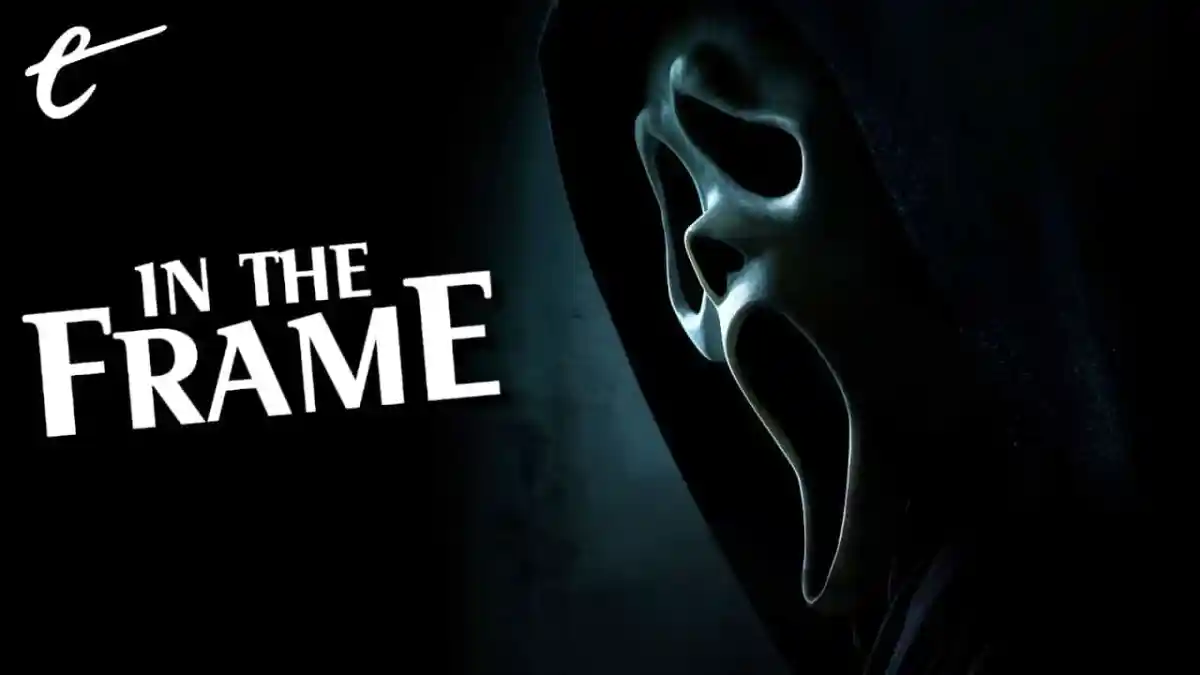This article contains spoilers for Scream (2022) in its discussion of how the film critiques Star Wars.
Scream is a horror franchise about the genre, as well as the relationship that Hollywood and audiences have to these films. Ghostface’s (Roger L. Jackson) trademark catchphrase is, “Do you like scary movies?” The best and the worst thing that can be said about the series’s latest entry, directed by Matt Bettinelli-Olpin and Tyler Gillett and simply titled Scream, is that it extends the scope of the series. The new Scream is less about horror films than it is about modern franchises in general.
To be fair, Scream does occasionally acknowledge the state of the modern horror franchise. The premise of the film is that the killer is staging a nostalgic back-to-basics “requel” in Woodsboro, akin to something like David Gordon Green’s Halloween films. Mindy Meeks-Martin (Jasmin Savoy Brown) even uses the term (along with “legacyquel”) during a sequence explaining the rules governing this particular entry in the series.
There are also allusions to “elevated horror,” an ongoing debate within horror fandom about whether films like Ari Aster’s Hereditary and Midsommar are inherently superior conventional studio horrors. References to Tara Carpenter’s (Jenna Ortega) affection for Jennifer Kent’s The Babadook bookend (or “Babadookend”) the film. It is implied that killers Richie Kirsch (Jack Quaid) and Amber Freeman (Mikey Madison) are old-school slasher fans who hate more prestigious horror.
However, Scream never seems quite as locked in on the horror genre as its predecessors in the franchise. It even seems to fudge its own internal history. At one point, Dewey Riley (David Arquette) boasts that the first victim is always part of the killer’s friend group, which was not true of either Phil Stevens (Omar Epps) and Maureen Evans (Jada Pinkett Smith) in Scream 2 or Cotton Weary (Liev Schreiber) in Scream 3. Richie boasts there are always two killers, which is not true of Scream 3.

Instead, Scream seems more dialed into larger debates taking place in movie fandom. If anything, the film feels more like a commentary on the recent Star Wars films, particularly The Force Awakens and The Rise of Skywalker, than it does on anything happening within the horror genre in particular. Indeed, there are several key plot points within Scream that feel much closer to J.J. Abrams’ Star Wars films than they do to Green’s Halloween, Nia DaCosta’s Candyman, or other legacy horror sequels.
This is most obvious just looking at the central characters, old and new. The first legacy character reintroduced in Scream is Dewey, former sheriff of Woodsboro. When the audience last saw Dewey in Scream 4, he seemed to be living an ideal life. He lived in a nice house. He was married to the love of his life, reporter Gale Weathers (Courteney Cox). After years of being treated like a joke, Dewey was a cornerstone of the Woodsboro community. His deputy, Judy Hicks (Marley Shelton), even lusted after him.
When the audience rejoins Dewey a decade later in Scream, he is living alone in a rundown trailer. He left his marriage because it became too hard for him. He was asked to resign as the local sheriff. It is heavily implied that Dewey is an alcoholic. He is a shell of his former self. It recalls the reintroduction of Han Solo (Harrison Ford) in The Force Awakens, who is similarly revealed to have abandoned his own marriage to Leia Organa (Carrie Fisher).
Much like The Force Awakens kills off Solo to prove that “anyone can die” in this belated sequel, Scream kills off Dewey. While Solo is impaled on his son’s lightsaber, Dewey is stabbed through both the front and the back by Amber. Using her voice disguiser, Amber even acknowledges how big a deal it is to kill an original cast member, telling Dewey, “It’s an honor.” It’s hard to think of a comparable moment using an original cast member in a long-delayed horror legacy sequel.

There are other echoes to be found in the film’s new lead character, Samantha Carpenter (Melissa Barrera). Early on, it is revealed that Sam is the secret daughter of Billy Loomis (Skeet Ulrich), the killer in the original film. She is also implicitly the granddaughter of Debbie Loomis (Laurie Metcalf), the killer in the first sequel. The plot of Scream is spurred when Amber discovers this dark secret about the Carpenter family and hatches a murderous scheme around it with Richie.
The use of this trope is interesting and complicated. There are plenty of horror sequels about the secret children of these franchise serial killers. Maggie Burroughs (Lisa Zane) discovers that she is the secret daughter of Freddy Krueger (Robert Englund) in Freddy’s Dead: The Final Nightmare. The plot of Halloween 6: The Curse of Michael Myers focuses on the characters trying to protect a baby named Steven (Emily Haterson) that might be the spawn of Michael Myers (George P. Wilbur).
However, those are not “requels” or “legacyquels” as we currently understand the terms. Modern horror sequels are more likely to erase these secret relatives. David Gordon Green’s Halloween explicitly removes the secret sibling relationship between Laurie Strode (Jamie Lee Curtis) and Michael Myers (James Jude Courtney) introduced in Halloween II. Other modern horror legacyquels like Nia DaCosta’s Candyman or Don Mancini’s Cult of Chucky focus on child survivors of these killers.
In the context of the film’s discussion of these sorts of generational follow-ups, the reveal of Sam’s parentage invites comparison to the reveal that Rey (Daisy Ridley) was the secret granddaughter of Emperor Palpatine (Ian McDiarmid) in The Rise of Skywalker, tying her back to the overarching villain of the original Star Wars trilogy. Much like “somehow” McDiarmid reprises his role as Palpatine in The Rise of Skywalker, Ulrich returns to play Billy Loomis in Scream, haunting Sam throughout the film.

The presence of Ulrich as Billy in Scream is uncanny. The Scream series has never been particularly supernatural or subjective. Indeed, prior to Ulrich’s return, the closest point of comparison is probably Sidney Prescott’s (Neve Campbell) nightmare in Scream 3. Billy proceeds to guide and advise his daughter in this ghostly form. It recalls the way that characters like Obi-Wan Kenobi (Alec Guinness) would impart advice to the younger generation in the Star Wars films.
There are other meta-textual clues that tie Scream more firmly to Star Wars than to any modern horror franchise. During a discussion of the in-universe Stab franchise, the films based around the various killing sprees in the world of Scream, Mindy reveals a recent Stab film was directed by “the Knives Out guy,” Rian Johnson. Johnson directed The Last Jedi, a Star Wars film that certain sections of Star Wars fandom took about as well as Richie and Amber have taken the latest Stab movies.
These parallels become even more pronounced at the climax of Scream. The third act of Scream finds Richie and Amber staging a killing spree that takes its cues directly from the third act of the original film, right down to using the same house. It feels like a cue lifted directly from criticisms of The Force Awakens, with many critics noting that J.J. Abrams’ sequel could be described as a fairly direct remake of the original Star Wars. This criticism is less common when it comes to modern horror sequels.
Then Richie and Amber reveal the motivation for their killing spree. They believe that the Stab movies have been taken away from the fans and that true fans need to rise and angrily reclaim what has been taken from them. The two budding killers met on “the Stab subreddit.” Amber claims that she was “radicalized” by “the message boards.” Scream is not subtle in making its point. Pressing a knife to Sidney’s throat, Richie unironically asks, “How can fandom be toxic?”

To be clear, Scream deserves considerable credit for engaging directly with the excesses of vocal and hateful online fandom. After all, Richie and Amber are just committing a more literal sort of harassment than the kind that drove Star Wars actor Kelly Marie Tran off social media. At a time when these sorts of franchises seem more likely to appease these fans, with The Rise of Skywalker feeling tailor-made for them, it’s refreshing to see a major film series call these voices out.
At the same time, there is a sense that Scream has lost some of the specificity that made the original four films so compelling. Those films, particularly the three with writing credits for Kevin Williamson, were specifically about horror movies and the audience’s relationship to the violence baked into the genre. In some ways, for example, the treatment of Sidney in Scream 2 is a blueprint for the modern approach to characters like Laurie Strode in the more recent Halloween films.
There are specific controversies within horror fandom that Scream could have explored. The script alludes to the ongoing debates around the distinction between “elevated” and traditional horror but does little more. There might be something interesting in playing with the vocal fans who reject the very idea of PG-13 horror. Given that the first three Scream films wrestle with the misogyny that can simmer in the slasher genre, it might be worthwhile to tackle modern reactionary fandom.
Despite its pedigree and as the latest entry in a postmodern and self-aware franchise about horror movies, Scream doesn’t really feel like a particularly contemplative interrogation of modern horror movies. It feels more like a fairly conventional slasher movie that is also a cutting commentary on J.J. Abrams’ Star Wars movies.






Published: Jan 17, 2022 11:00 am